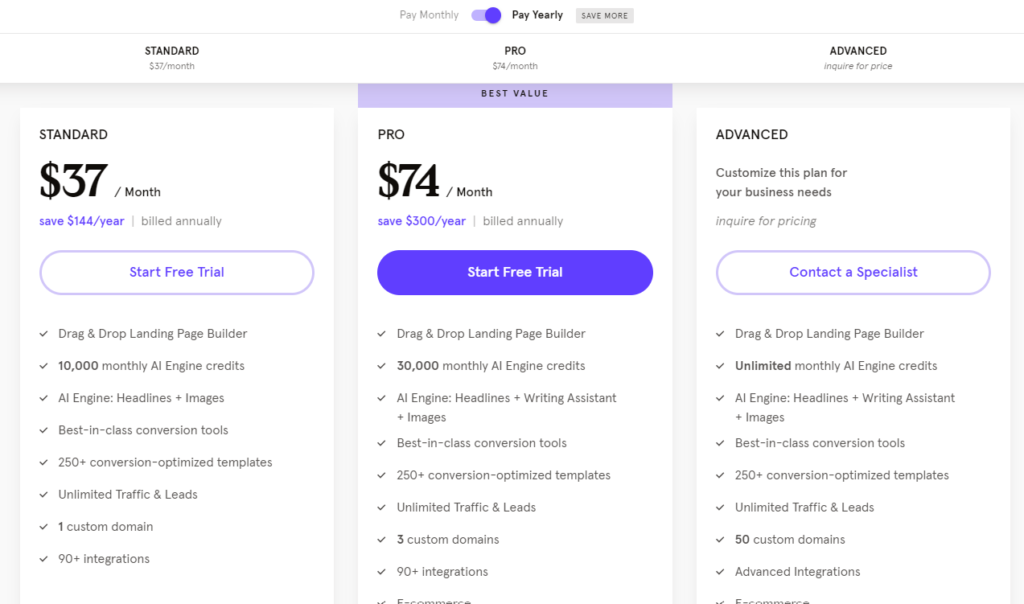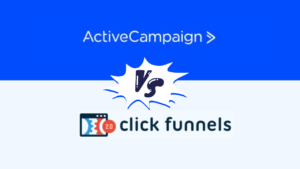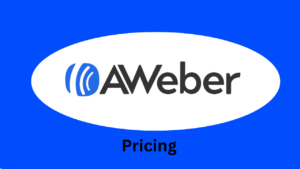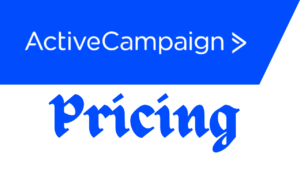1. Introduction
In the battle of ClickFunnels vs Leadpages, choosing the right platform can dramatically influence your online marketing success. This blog post delves into a comprehensive comparison of these two giants, providing insights into their features, pricing, customer support, and more, to help you decide which tool is the best fit for your digital marketing needs. Whether you’re looking to optimize your sales funnel or enhance your lead generation efforts, understanding the nuances of ClickFunnels and Leadpages is crucial. Let’s embark on this journey to uncover which platform can elevate your marketing strategies and drive your business towards its goals
YOU MIGHT ALSO CONSIDER TRYING THESE ALTERNATIVE EMAIL MARKETING TOOLS.
Table of Contents
2. An Overview: Navigating the World of ClickFunnels vs Leadpages
Choosing the right platform to build your online presence and boost your sales can feel like navigating through a dense jungle. In this quest, two giants stand out prominently: ClickFunnels and Leadpages. These platforms promise to simplify your digital marketing efforts, but with so many features, pricing plans, and user experiences to consider, how do you choose the right one for your needs?
This comprehensive guide dives into the core of ClickFunnels vs Leadpages, comparing their key features, usability, pricing, and more to help you make an informed decision. Whether you’re a solo entrepreneur, a small business owner, or part of a larger marketing team, understanding the strengths and weaknesses of each platform can significantly impact your online strategy.
Why compare ClickFunnels and Leadpages? Both platforms offer powerful tools for building landing pages, generating leads, and optimizing your sales funnels. However, they cater to slightly different audiences and needs. ClickFunnels focuses on creating a seamless sales funnel that guides your visitors through the buying process, while Leadpages excels at creating beautiful landing pages designed to capture leads and enhance your marketing campaigns.
The Goal: Our aim is not just to list features but to delve into how these platforms can grow your business, improve your marketing efficiency, and increase your sales. By the end of this guide, you’ll have a clear understanding of which platform aligns best with your business goals, simplifying your digital marketing tools choice.
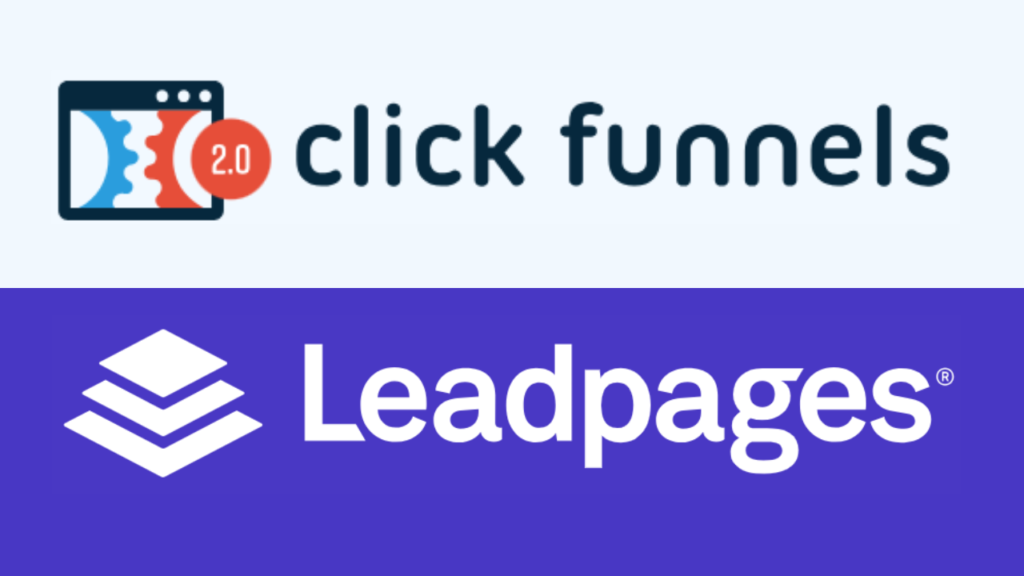
3. Ease of Use: ClickFunnels vs Leadpages
When it comes to building your online presence, the ease of use of the tools you choose can significantly impact your productivity and efficiency. In this section, we compare ClickFunnels and Leadpages, focusing on how user-friendly each platform is for beginners and seasoned marketers alike.
ClickFunnels: Simplifying the Sales Funnel Process
ClickFunnels stands out for its comprehensive approach to sales funnel creation. It guides users through a step-by-step process, making it straightforward to create a funnel from scratch. The drag-and-drop editor allows for easy customization of pages, requiring no coding knowledge. ClickFunnels also offers pre-built funnel templates that cater to various business needs, from lead generation to sales, making it easier to get started.
However, the wealth of features and options might initially overwhelm new users. The platform’s focus on sales funnels means there is a learning curve to fully leverage its capabilities. Once over the initial hump, users find ClickFunnels incredibly powerful for managing and optimizing their sales processes.
Leadpages: Mastering Landing Pages with Ease
Leadpages prioritizes simplicity and speed in creating landing pages. Its interface is clean and intuitive, allowing users to quickly build pages with its drag-and-drop builder. The platform offers a wide range of customizable templates that are optimized for conversion, making it easy to create professional-looking pages without any design experience.
For those focused on landing pages and lead generation, Leadpages is arguably more accessible than ClickFunnels. The platform is designed to get your pages up and running in minutes, appealing to users who want to implement fast, effective marketing campaigns without the complexity of a full sales funnel builder.
Comparing the Learning Curve
Both platforms offer extensive resources, including tutorials and customer support, to help users navigate their features. ClickFunnels provides a more robust set of tools for funnel building, which might take longer to master. In contrast, Leadpages focuses on landing pages and offers a more streamlined, easier-to-learn experience.
In Summary
Choosing between ClickFunnels and Leadpages on the basis of ease of use largely depends on your specific needs. If you require a comprehensive tool to build and manage sales funnels, ClickFunnels offers a powerful, albeit more complex, solution. Leadpages, on the other hand, is your go-to for quick, efficient landing page creation with a shorter learning curve. Understanding your marketing objectives will guide you to the platform that best suits your workflow and goals.
4. Template Selection and Customization: ClickFunnels vs Leadpages
A crucial factor in the effectiveness of your online marketing efforts is the design and functionality of your landing pages and sales funnels. Here, we dive into the template selection and customization options offered by ClickFunnels and Leadpages, highlighting how each platform caters to your creative needs.
ClickFunnels: Versatile Templates for Every Stage of Your Funnel
ClickFunnels provides a wide array of template options designed to cover each step of your sales funnel, from initial lead capture to final purchase. These templates are crafted with conversion in mind, ensuring that regardless of your goal, there’s a funnel template ready to be customized. The customization process is straightforward with their drag-and-drop editor, allowing you to tweak every element of the template to fit your brand’s aesthetics and messaging. While the focus is on functionality and conversion, users have the freedom to be as creative as they wish, making no two funnels look the same.
Leadpages: High-Converting Landing Page Templates
Leadpages shines with its extensive library of beautifully designed landing page templates. These templates are categorized by industry and purpose, making it easy to find a perfect fit for your campaign. Customization in Leadpages is also user-friendly, thanks to its intuitive drag-and-drop editor. You can easily modify layouts, add or remove elements, and personalize every detail to match your brand’s identity. The platform emphasizes design and usability, ensuring that even those without any design background can create professional and effective landing pages.
Customization Depth and Flexibility
- ClickFunnels: Offers deep customization options for each step of the sales process, enabling businesses to fine-tune their funnels for maximum conversion.
- Leadpages: Provides a high degree of design flexibility within the landing pages, focusing on aesthetics and user experience.
In Summary
Both ClickFunnels and Leadpages offer robust template selections and customization options, but they serve slightly different purposes. ClickFunnels’ strength lies in its comprehensive approach to funnel building, offering templates that cater to various stages of the sales process and providing the tools to customize these funnels extensively. Leadpages, meanwhile, focuses on landing pages, offering a wide range of high-quality, conversion-optimized templates that are easy to customize, even for those without a design background. Your choice between ClickFunnels and Leadpages should align with your primary marketing objectives—whether you’re looking to build a full sales funnel or create impactful landing pages to generate leads.
5. Features and Functionality: ClickFunnels vs Leadpages
In the digital marketing toolbox, ClickFunnels and Leadpages are powerful tools, each boasting features that can revolutionize how businesses approach online sales and lead generation. Understanding the core functionalities of each platform will help you decide which tool better aligns with your business goals.
ClickFunnels: A Comprehensive Sales Funnel Builder
ClickFunnels isn’t just about creating pages; it’s about building entire sales funnels that guide visitors through a series of steps towards a conversion goal. Its standout features include:
- Sales Funnel Creation: ClickFunnels provides a suite of tools to create complete sales funnels, from landing pages to checkout processes. This end-to-end approach is designed to maximize conversions and sales.
- Integrated Payment Processing: With ClickFunnels, you can integrate multiple payment gateways directly into your funnels, streamlining the checkout process.
- Email Automation: ClickFunnels offers built-in email autoresponders and automation capabilities, allowing you to nurture leads without needing a third-party email service.
- Membership Site Functionality: You can create membership sites within ClickFunnels, providing exclusive content or courses to your subscribers.
Leadpages: Specialized in High-Converting Landing Pages
While ClickFunnels focuses on the entirety of the sales process, Leadpages hones in on creating and optimizing landing pages. Its core features include:
- Landing Page Templates: Leadpages offers a vast library of high-quality, conversion-optimized landing page templates.
- Lead Capture Tools: The platform includes features like pop-ups and alert bars to help capture leads on your pages.
- A/B Testing: Leadpages allows you to easily test different versions of your landing pages to see which one performs better in terms of conversion.
- Fast Loading Speed: Optimized for performance, Leadpages’ pages are designed to load quickly, enhancing user experience and SEO.
In Summary
Choosing between ClickFunnels and Leadpages depends on your specific needs. If your primary goal is to create a seamless sales process that nurtures your audience from awareness to purchase, ClickFunnels offers the comprehensive toolkit you need. On the other hand, if you’re focused on generating leads through high-converting landing pages and prefer a platform that excels in creating captivating, fast-loading pages, Leadpages is the way to go.
Each platform has its strong points: ClickFunnels for its all-in-one sales funnel approach and Leadpages for its focus on landing page performance and optimization. Understanding these core features and functionalities will guide you in selecting the platform that best suits your marketing strategy.
6. Integration Capabilities: ClickFunnels vs Leadpages
In the digital marketing ecosystem, the ability of a platform to integrate seamlessly with other tools can greatly amplify its effectiveness. Both ClickFunnels and Leadpages offer extensive integration capabilities, allowing users to connect their marketing, analytics, payment, and email systems in one cohesive workflow. Understanding the breadth and depth of these integrations is key to maximizing the potential of your chosen platform.
ClickFunnels: Streamlined Integrations for a Unified Sales Process
ClickFunnels emphasizes the creation of a seamless sales funnel, and its integration capabilities are designed to support this goal. Key integration features include:
- Email Marketing Services: ClickFunnels integrates with major email marketing platforms like Mailchimp, ActiveCampaign, and ConvertKit, enabling automated email sequences that nurture leads along the funnel.
- Payment Gateways: It supports various payment options, including Stripe, PayPal, and ClickBank, allowing for easy collection of payments within the sales funnel.
- Webinar Platforms: Integration with webinar platforms such as Zoom and GoToWebinar facilitates the hosting of webinars directly within the sales funnels, enhancing lead generation and conversion efforts.
- CRM Systems: By connecting with CRM tools like Salesforce and HubSpot, ClickFunnels ensures that customer data is seamlessly synced across platforms, optimizing customer relationship management.
Leadpages: Diverse Integrations for Enhanced Lead Generation
Leadpages focuses on maximizing lead generation and conversion through landing pages, and its integrations reflect this priority. Notable integrations include:
- Analytics and Tracking Tools: Leadpages integrates with Google Analytics, Facebook Pixel, and other analytics tools to track the performance of landing pages and optimize conversion rates.
- Email Service Providers: Similar to ClickFunnels, Leadpages offers integration with leading email services, allowing for the capture and nurturing of leads directly from landing pages.
- Social Media Platforms: It provides easy integration with social media platforms, enabling the promotion of landing pages across networks and the tracking of social media campaigns.
- E-commerce Platforms: For businesses selling products online, Leadpages integrates with e-commerce solutions like Shopify, facilitating the creation of product landing pages and checkout processes.
In Summary
Both ClickFunnels and Leadpages offer robust integration capabilities, but their focus differs in line with their core functionalities. ClickFunnels excels in creating a unified sales process, offering integrations that enhance the entire funnel from lead capture to sale. Leadpages, on the other hand, shines in lead generation and conversion optimization, with integrations that bolster the effectiveness of landing pages and lead management.
The choice between ClickFunnels and Leadpages should consider which aspects of your digital marketing strategy require the most support. Whether you need a platform that integrates well with a comprehensive sales strategy or one that focuses on optimizing landing pages and lead capture, examining the integration capabilities of each will guide you to the right decision for your business.
7. E-commerce Support: ClickFunnels vs Leadpages
For online businesses, the ability to effectively sell products and manage transactions directly impacts growth and profitability. Both ClickFunnels and Leadpages offer e-commerce support, but their approaches and capabilities vary. Understanding these differences is key to choosing the platform that best fits your online selling strategy.
ClickFunnels: Comprehensive Sales Funnel Creation
ClickFunnels shines in its ability to create comprehensive sales funnels that guide potential customers through a series of steps towards a purchase. This platform is particularly strong in the following areas:
- Product Sales Funnels: It allows you to build detailed sales funnels for your products, including upsells, downsells, and order bumps to increase the average order value.
- Payment Integrations: ClickFunnels integrates seamlessly with major payment gateways, such as PayPal and Stripe, facilitating easy and secure transactions within your sales funnels.
- Membership and Subscription Sales: You can create membership areas for selling subscription-based products or content, offering a recurring revenue model.
- Digital Product Delivery: The platform supports the sale and delivery of digital products, making it an excellent choice for online courses, e-books, and more.
Leadpages: Landing Page Optimization for Product Sales
While not as comprehensive in its sales funnel capabilities, Leadpages offers strong support for e-commerce through optimized landing pages and integration features:
- E-commerce Platform Integration: Leadpages integrates with platforms like Shopify, allowing you to link your e-commerce store with your landing pages for seamless product sales.
- Checkout Widgets: Utilize Leadpages’ checkout widgets for direct sales on landing pages, supported by Stripe integration to handle transactions efficiently.
- Pop-ups and Alert Bars: Effective tools for promoting products, announcing sales, and capturing leads directly on your landing pages.
In Summary
Your choice between ClickFunnels and Leadpages for e-commerce support should align with your business model and sales strategy. ClickFunnels is the go-to option for businesses looking for an all-in-one solution to build detailed sales funnels, including payment processing and digital product delivery. Leadpages, on the other hand, is ideal for businesses that want to quickly set up high-converting landing pages with direct sales capabilities, especially when used in conjunction with e-commerce platforms like Shopify. Each platform offers unique advantages for online sellers, so selecting the one that matches your approach to e-commerce is crucial for maximizing your online sales potential.
8. Lead Generation and Conversion Tools: ClickFunnels vs Leadpages
For any online business, the ability to capture leads and convert them into customers is crucial. ClickFunnels and Leadpages are both designed to help you achieve these goals, but they offer different tools and features for lead generation and conversion. Understanding these differences will help you choose the platform that aligns with your marketing strategies.
ClickFunnels: Focused on Funnel-Based Lead Conversion
ClickFunnels emphasizes the creation of sales funnels that not only attract leads but also guide them towards making a purchase. Its key features include:
- Opt-in Forms and Pop-Ups: These are integrated into the sales funnels to capture leads at various stages of the customer journey.
- Email Autoresponder Sequences: Automate follow-up emails to nurture leads down the funnel, increasing the chances of conversion.
- Webinar Funnels: Utilize webinar funnels to engage with leads, provide value, and promote your products or services.
- A/B Testing: Test different elements of your funnels to find the most effective strategies for converting leads into customers.
Leadpages: Expertise in High-Converting Landing Pages
Leadpages specializes in creating landing pages optimized for lead generation, with tools designed to capture and convert traffic:
- Highly Customizable Templates: Tailor your landing pages to target specific audiences, increasing relevance and conversion potential.
- Lead Capture Tools: Use pop-ups, alert bars, and embedded forms to effectively capture lead information across your pages.
- A/B Testing: Similar to ClickFunnels, Leadpages offers A/B testing capabilities to optimize your landing pages for higher conversion rates.
- Analytics and Insights: Access detailed analytics to understand how your pages perform and where you can improve.
In Summary
ClickFunnels and Leadpages offer robust platforms for lead generation and conversion, but their approaches cater to different strategies. ClickFunnels provides a comprehensive toolkit for building entire sales funnels that nurture leads from awareness to purchase. It’s ideal for businesses that sell products or services requiring education and multiple touchpoints before purchase. Leadpages, on the other hand, excels in creating targeted, high-converting landing pages that are perfect for businesses focusing on maximizing immediate lead captures with less emphasis on long sales cycles. Your choice between these platforms should be based on your specific lead generation and conversion strategies, as well as how you prefer to engage with your potential customers.
9. Analytics and Reporting: ClickFunnels vs Leadpages
In the digital marketing world, data is king. Effective analytics and reporting tools are essential for understanding your audience, optimizing your campaigns, and ultimately increasing your conversion rates. Both ClickFunnels and Leadpages offer analytics and reporting features, but they cater to these needs in different ways. Let’s delve into how each platform handles analytics and reporting.
ClickFunnels: Comprehensive Funnel Analytics
ClickFunnels provides detailed analytics focused on funnel performance, offering insights that help you understand how well your sales funnels are converting. Key features include:
- Funnel Performance Overview: View important metrics such as page views, opt-ins, and sales for each step of your funnel.
- A/B Testing Results: Easily compare the performance of different funnel versions to see which one converts better.
- Sales and Payment Analytics: Get detailed reports on your sales, including order value, payment method, and purchase behavior.
These analytics are designed to give you a clear understanding of where your funnels might be leaking and where they’re performing well, allowing you to make data-driven decisions to improve your results.
Leadpages: Landing Page and Conversion Analytics
Leadpages focuses on providing analytics for landing pages and lead generation efforts. Its analytics suite includes:
- Conversion Rate Tracking: Monitor how well your landing pages convert visitors into leads or customers.
- A/B Testing Analysis: Test different elements on your pages and receive detailed reports on which variations perform the best.
- Real-Time Data: Access up-to-the-minute analytics to see how changes to your pages affect performance.
Leadpages’ analytics are geared towards optimizing landing pages for higher conversion rates, offering insights that help you tweak your pages for maximum effectiveness.
In Summary
Both ClickFunnels and Leadpages provide powerful analytics and reporting features, but their focus differs based on the platform’s primary function. ClickFunnels offers comprehensive analytics centered around sales funnel performance, making it invaluable for businesses focused on optimizing their entire sales process. Leadpages, in contrast, delivers detailed analytics specifically for landing pages and lead generation, perfect for marketers looking to increase the effectiveness of their landing pages. Understanding your primary goals—whether it’s optimizing sales funnels or improving landing page conversions—will help you choose the platform that best meets your analytics and reporting needs.
10. SEO and Mobile Optimization: ClickFunnels vs Leadpages
In the digital age, ensuring your online content is not only visible to search engines but also perfectly accessible on mobile devices is critical. Both ClickFunnels and Leadpages offer features aimed at SEO (Search Engine Optimization) and mobile optimization, but their capabilities and focus areas differ. Understanding these can help you choose the right platform to boost your online visibility and user engagement.
ClickFunnels: Building SEO-Friendly Funnels
ClickFunnels allows for basic SEO customization on its pages to help you rank in search engine results. Key features include:
- Meta Tags and Descriptions: Customize your funnel pages’ title tags, meta descriptions, and keywords to improve search engine visibility.
- Mobile-Responsive Designs: All ClickFunnels pages are designed to be responsive, ensuring they look good and function well on any device.
- SSL Certificate: ClickFunnels provides an SSL certificate for your funnel pages, a ranking factor for Google and essential for user trust.
While ClickFunnels offers the necessary tools for basic SEO and ensures mobile responsiveness, its primary focus remains on funnel creation and conversion optimization rather than advanced SEO features.
Leadpages: Prioritizing SEO and Mobile-First Landing Pages
Leadpages places a strong emphasis on SEO and mobile optimization for its landing pages. Features include:
- Advanced SEO Settings: Beyond basic meta tags, Leadpages allows for more detailed SEO settings, including image alt texts and more, helping your pages to rank higher.
- Mobile-Responsive Templates: Every template is designed to be mobile-responsive, with the platform offering additional features to optimize mobile user experiences.
- Page Loading Speed: Leadpages focuses on fast loading times, a crucial SEO factor, ensuring your pages perform well on both desktop and mobile devices.
Leadpages stands out for its commitment to SEO and mobile optimization, offering detailed customization options and prioritizing page speed and user experience on mobile devices.
In Summary
Both ClickFunnels and Leadpages recognize the importance of SEO and mobile optimization, but Leadpages offers more advanced features and a stronger focus on these areas. If your strategy relies heavily on search engine rankings and providing an exceptional mobile user experience, Leadpages might be the more suitable choice. However, if you’re looking for a platform that balances funnel building with basic SEO and mobile responsiveness, ClickFunnels will serve your needs effectively. Ultimately, the decision should align with your marketing goals and the specific requirements of your online presence.
11. Pricing and Plans: ClickFunnels vs Leadpages
When choosing between ClickFunnels and Leadpages, understanding the pricing and plans offered by each platform is crucial to making an informed decision that aligns with your budget and business needs. Let’s break down the options available, focusing on the value and features each provides.
ClickFunnels Pricing: Tailored for Comprehensive Funnel Building
Based on the latest information available, ClickFunnels offers three main pricing tiers for its users in 2024, aiming to cater to a range of business sizes and needs:
- Basic Plan: Priced at $147 per month, or a reduced annual rate of $127 per month (saving $240/year). This plan includes access to 1 website, 20 funnels, 3 users, 1 domain, and 10,000 contacts among other features. It’s designed for individuals or small businesses just starting out with funnel building.
- Pro Plan: Available at $197 per month, with an annual option of $157 per month (saving $480/year). This tier expands on the Basic plan by offering 1 website, 100 funnels, 5 users, 3 domains, and 25,000 contacts. This plan suits growing businesses that need more capacity and features for their expanding marketing efforts.
- Funnel Hacker Plan: The most comprehensive plan, normally $497 per month, is offered at a discounted rate of $208 per month when billed annually (saving $3,468/year). It includes 3 websites, unlimited funnels, 15 users, 9 domains, and 200,000 contacts. This plan is tailored for larger businesses or those with advanced funnel needs and high traffic volumes.
Each plan provides a variety of features to support marketing and sales funnels, including unlimited courses, workflows, pages, products, and email sequences. Higher-tier plans offer additional capabilities such as API access to integrate with other tech stacks.
For businesses considering ClickFunnels, the choice of plan will depend on their specific needs in terms of funnel complexity, volume of traffic, and integration requirements. The platform also offers a 14-day free trial, allowing users to test its features before committing to a plan.
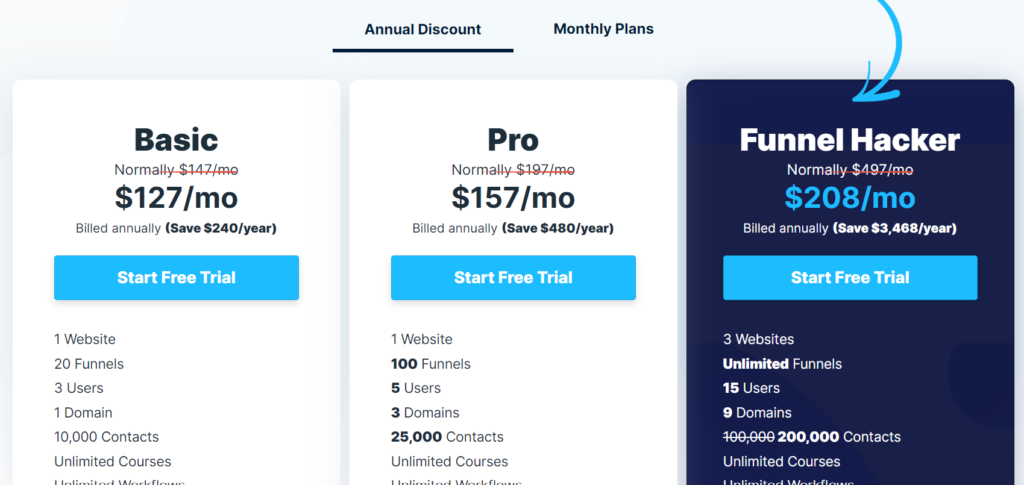
Leadpages Pricing: Focused on Landing Page Creation and Conversion
For Leadpages in 2024, the platform offers three main pricing tiers tailored to suit a range of needs, from basic landing page creation to more advanced features for growing businesses. Here’s a concise summary of their plans:
- Standard Plan: Priced at $37 per month when billed annually, this plan is designed for individuals or small businesses starting out. It includes one site, unlimited traffic and leads, landing pages, pop-ups, alert bars, free hosting, a free custom domain with annual billing, mobile-responsive site templates, and tech support through chat and email, among other features.
- Pro Plan: At $74 per month with annual billing, the Pro plan builds upon the Standard offering by adding up to three sites and introducing priority tech support (including phone support), online sales and payments capabilities, and unlimited A/B split testing. This plan is suited for medium-sized businesses that require more comprehensive tools and support for their marketing efforts.
- Advanced Plan: This plan provides custom pricing and is geared towards larger businesses or those with more sophisticated needs. It includes everything in the Pro plan plus advanced integrations, five Pro sub-accounts, and a master account, making it ideal for businesses seeking extensive functionality and scalability.
Leadpages also offers a 14-day free trial for new users to explore the platform’s capabilities before committing to a paid plan. Additionally, users who opt for annual billing can enjoy significant savings compared to the monthly billing option.
In Summary
Choosing between ClickFunnels and Leadpages based on pricing and plans involves evaluating your specific needs against what each platform offers. ClickFunnels is more suited for users looking for an all-in-one solution to create comprehensive sales funnels, with pricing that reflects its broader range of capabilities. Leadpages, on the other hand, is ideal for those focused on landing pages and lead generation, offering a more affordable entry point and plans that scale with your business. Carefully consider your marketing strategies, the features you’ll likely use, and how each platform’s pricing structure aligns with your goals to make the best choice for your business.
12. Customer Support and Community: ClickFunnels vs Leadpages
In the fast-paced world of digital marketing, having access to responsive customer support and a vibrant community can be just as crucial as the features of the platform itself. ClickFunnels and Leadpages both recognize this need, offering various levels of support and fostering communities around their products. Let’s explore what each platform offers in terms of customer support and community engagement.
ClickFunnels: Comprehensive Support and an Engaged Community
ClickFunnels takes customer support seriously, providing multiple channels for users to get help and learn more about maximizing the platform’s potential:
- Customer Support Channels: ClickFunnels offers support through email, live chat, and a ticketing system, aiming to address user issues promptly.
- Knowledge Base: A comprehensive resource filled with articles, tutorials, and FAQs designed to help users navigate and troubleshoot common issues independently.
- Community Engagement: One of ClickFunnels’ standout features is its vibrant community, particularly the official Facebook group. Here, users can share experiences, offer advice, and provide support to each other, fostering a sense of belonging and collective learning.
Leadpages: Dedicated Support and Resources for Growth
Leadpages also places a high emphasis on customer support and community, with several resources aimed at helping users succeed:
- Customer Support Options: Leadpages provides support primarily through email and live chat, with priority support available for higher-tier plan subscribers.
- Educational Resources: An extensive library of guides, webinars, and tutorials is available, offering insights into landing page optimization, lead generation strategies, and more.
- Community Platform: While Leadpages’ community may not be as large as ClickFunnels’, it still offers a dedicated space for users to connect, particularly through its official Facebook group and webinars where users can interact and learn from one another.
In Summary
Both ClickFunnels and Leadpages understand the importance of customer support and community in the user experience. ClickFunnels offers a wide range of support options and boasts a notably active and supportive community, making it an excellent choice for users who value collaboration and peer-to-peer learning. Leadpages, while offering strong support and educational resources, provides a more focused community experience, ideal for users looking for targeted advice and strategies for landing page optimization and lead generation. Depending on your preferences for community interaction and learning resources, either platform can offer the support you need to grow your online business effectively.
13. Pros and Cons: ClickFunnels vs Leadpages
When deciding between ClickFunnels and Leadpages for your online marketing and sales efforts, weighing the advantages and disadvantages of each platform can provide clearer insights. Below, we explore the pros and cons of ClickFunnels and Leadpages, offering a balanced view to help inform your decision.
ClickFunnels Pros:
- Comprehensive Funnel Builder: ClickFunnels specializes in creating complete sales funnels that guide visitors through the buying process, increasing the chances of conversion.
- All-in-One Solution: It offers a range of tools for email marketing, webinar hosting, and affiliate management, making it a versatile platform for various marketing needs.
- Vibrant Community: The active and engaged ClickFunnels community provides a wealth of knowledge and support for users.
ClickFunnels Cons:
- Higher Price Point: ClickFunnels’ comprehensive features come at a higher cost, which might be a barrier for small businesses or solo entrepreneurs on a tight budget.
- Steep Learning Curve: The extensive functionality can be overwhelming for beginners, requiring a significant investment of time to master.
Leadpages Pros:
- User-Friendly Landing Page Builder: Leadpages focuses on ease of use, making it simple for anyone to create high-converting landing pages, regardless of technical expertise.
- Affordable Pricing: With plans starting at a lower price point, Leadpages is accessible to businesses of all sizes, especially those just starting out.
- Optimized for Lead Generation: The platform is designed to maximize lead capture, featuring a variety of tools specifically for this purpose.
Leadpages Cons:
- Limited in Scope: While excellent for creating landing pages, Leadpages lacks the broader range of sales funnel building features found in ClickFunnels.
- Fewer Advanced Features: Compared to ClickFunnels, Leadpages offers fewer options for complex funnel automation and segmentation.
In Summary
ClickFunnels and Leadpages serve different needs within the spectrum of online marketing and sales. ClickFunnels offers a comprehensive, all-in-one solution for businesses looking to build detailed sales funnels and implement advanced marketing strategies. It’s suited for users who need a wide range of tools and are willing to invest in learning how to use them effectively. Leadpages, on the other hand, is ideal for those focusing primarily on landing page creation and lead generation, offering a simpler, more affordable solution. Your choice between ClickFunnels and Leadpages should be guided by your specific marketing goals, budget, and the level of complexity you need in your sales and marketing efforts.
14. Success Stories and Use Cases: ClickFunnels vs Leadpages
Exploring real-world success stories and use cases can illuminate how ClickFunnels and Leadpages have helped businesses achieve their online marketing goals. These examples showcase the practical applications and results of using each platform, providing inspiration and insight for potential users.
ClickFunnels Success Stories:
ClickFunnels has been instrumental in helping businesses across various industries to streamline their sales processes and significantly boost their conversion rates. Here are a few highlights:
- E-commerce Stores: Many online retailers have utilized ClickFunnels to create seamless shopping experiences, incorporating upsells and cross-sells to increase average order values.
- Digital Product Sellers: Authors, course creators, and software developers have leveraged ClickFunnels to sell digital products, using webinars and educational funnels to educate and convert their audience.
- Service Providers: Coaches, consultants, and service-based businesses have found success with ClickFunnels by using lead generation funnels to attract and qualify potential clients.
Leadpages Use Cases:
Leadpages shines in its ability to help businesses capture leads and create engaging landing pages that convert. Here are some common use cases:
- Small Business Promotions: Local businesses use Leadpages to promote special offers, events, and discounts, capturing leads and driving foot traffic with targeted landing pages.
- Content Creators: Bloggers and content creators employ Leadpages to grow their email lists, using opt-in pages to offer free resources in exchange for email addresses.
- Non-Profits and Charities: These organizations utilize Leadpages to increase awareness and drive donations, creating compelling landing pages that communicate their missions and impact.
In Summary
The success stories and use cases for ClickFunnels and Leadpages demonstrate the versatility and impact of both platforms. ClickFunnels offers a robust solution for businesses looking to create comprehensive sales funnels, driving sales and customer engagement. Leadpages, on the other hand, excels in lead generation and creating high-converting landing pages, making it a powerful tool for businesses of all sizes aiming to enhance their online presence and marketing efficiency. Whether you’re selling products, services, or aiming to grow your audience, both platforms offer compelling solutions backed by real-world successes.
15. Final Verdict and Recommendations: ClickFunnels vs Leadpages
After diving deep into the features, functionalities, pricing, and real-world applications of ClickFunnels and Leadpages, it’s clear that both platforms offer valuable tools for online marketing and sales. However, the best choice between them depends on your specific business needs, goals, and the type of marketing strategies you intend to implement. Here’s our final verdict and recommendations to help you make an informed decision.
ClickFunnels: The Comprehensive Sales Funnel Solution
If your marketing strategy revolves around creating detailed sales funnels that guide prospects through a journey from awareness to purchase, ClickFunnels is the superior choice. It’s especially beneficial for:
- Businesses selling products or services with a more complex sales cycle.
- Marketers looking to automate their sales process with integrated tools for email marketing, webinars, and payment processing.
- Entrepreneurs who value having a supportive community and extensive educational resources to optimize their funnels.
Leadpages: The Go-To for Landing Pages and Lead Generation
For businesses focused on building an online presence through high-converting landing pages and excelling in lead generation, Leadpages stands out. It’s ideal for:
- Small businesses and solopreneurs needing an affordable, straightforward solution for creating professional landing pages.
- Content creators, bloggers, and online educators aiming to grow their audience and email list with minimal technical hassle.
- Any business that requires rapid deployment of landing pages for promotions, events, or product launches.
In Summary
Both ClickFunnels and Leadpages have their strengths and are best suited to different types of users. Your decision should be based on whether your primary focus is on building comprehensive sales funnels or creating targeted landing pages designed to convert visitors into leads. Consider your business model, the complexity of your sales process, and your budget when choosing between ClickFunnels and Leadpages. Ultimately, both platforms are powerful tools in their own right, capable of significantly boosting your online marketing efforts.
16. Conclusion: Empowering Your Online Marketing Journey
Choosing between ClickFunnels and Leadpages is a pivotal decision that hinges on your specific online marketing objectives, budget constraints, and the intricacies of your sales process. Through this comprehensive guide, we’ve explored the multifaceted features, pricing, support, and real-world applications of both platforms, aiming to provide you with a clear roadmap to make an informed choice.
Key Takeaways:
- ClickFunnels offers a robust, all-in-one solution for businesses focused on building and optimizing sales funnels. It’s ideal for those looking to automate their marketing and sales processes comprehensively, despite its higher price point and steeper learning curve.
- Leadpages excels in creating high-converting landing pages and is particularly suited for small businesses, content creators, and anyone prioritizing ease of use and affordability. It stands out for rapid lead generation and campaign deployment.
Moving Forward:
The digital marketing landscape is ever-evolving, and the tools you choose today can significantly impact your business’s growth trajectory. Whether you opt for ClickFunnels’ comprehensive sales funnel approach or Leadpages’ specialized landing page creation, remember that the effectiveness of these tools ultimately depends on your strategy, execution, and continuous optimization.
Final Words:
Embrace the platform that aligns with your marketing goals and complements your business model. Remember, the success of your online marketing efforts is not solely dependent on the tools you use but on how you use them to engage with your audience, understand their needs, and provide value. Both ClickFunnels and Leadpages offer free trials, allowing you to test drive their features and ensure they meet your expectations before committing.
As you embark on this journey, keep experimenting, learning, and optimizing. The digital marketing world is your oyster, and with the right tools and strategies, there’s no limit to what you can achieve.

